Today Current Affairs: 6th July 2021 for UPSC IAS exams, State PSC exams, SSC CGL, State SSC, RRB, Railways, Banking Exam & IBPS, etc
Table of Contents
Sir Chettur Sankaran Nair:
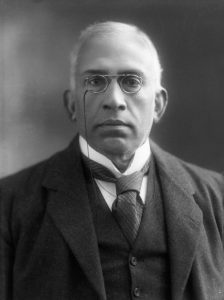
A biopic on Sir Chettur Sankaran Nair will be produced.
- It will be based on the book, ‘The case that shook the empire’ written by Raghu Palat and Pushpa Palat in 2019.
- Born in the year 1857 in Mankara village of Malabar’s Palakkad district.
- Known for being a passionate advocate for social reforms and a firm believer in the self-determination of India.
- He was an acclaimed lawyer and judge in the Madras High Court.
- He was one of the early builders of the Indian National Congress (INC), formed in 1885.
- In 1897, he became the youngest president of the INC in the history of the party till then, and the only Malayali to hold the post ever.
- In 1902, Lord Curzon appointed him a member of the Raleigh University Commission.
- In 1904, he was appointed as Companion of the Indian Empire by the King-Emperor and in 1912 he was knighted.
- He was appointed as a permanent judge in the Madras High Court in 1908.
- In 1915, he became part of the Viceroy’s Council, put in charge of the education portfolio.
- As a fervent freedom fighter, he firmly believed in India’s right for self-government.
- In 1919, as part of the Viceroy’s Executive Council, he played an important role in the expansion of provisions in the Montagu-Chelmsford reforms.
- It introduced a system of dyarchy in the provinces and increased participation of Indians in the administration.
- When the massacre of Jallianwala Bagh (13th April, 1919) happened, he resigned from the Viceroy’s Council in protest.
- His resignation shook the British government.
- In the immediate aftermath, press censorship in Punjab was lifted and martial law terminated.
- Further, a committee was set up under Lord William Hunter to examine the disturbances in Punjab.
- In his book ‘Gandhi and Anarchy’, he spelt out his critique of Gandhi’s methods, especially those of non-violence, civil disobedience and non-cooperation.
- He believed that any of these movements was destined to lead to riots and bloodshed.
Anti-Dumping Duty:
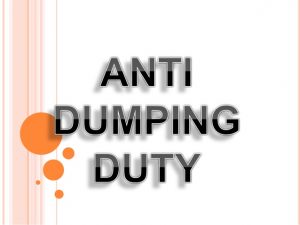
The government has decided not to impose Anti-Dumping Duty (ADD) on imports of certain copper products, from China, Thailand, Korea and three other countries.
- In April, Directorate General of Trade Remedies (DGTR) recommended imposing the duty on “copper and copper alloy flat-rolled products” from China, Korea, Malaysia, Nepal, Sri Lanka and Thailand, after conducting a probe.
- However, the Ministry of Finance takes the final call to impose these duties and issues notification for the same.
Anti Dumping Duty:
- Dumping is said to occur when the goods are exported by a country to another country at a price lower than the price it normally charges in its own home market.
- This is an unfair trade practice which can have a distortive effect on international trade.
- Objective:
- Imposition of Anti-dumping duty is a measure to rectify the situation arising out of the dumping of goods and its trade distortive effect.
- In the long-term, anti-dumping duties can reduce the international competition of domestic companies producing similar goods.
- It is a protectionist tariff that a domestic government imposes on foreign imports that it believes are priced below fair market value.
- The use of anti-dumping measures as an instrument of fair competition is permitted by the World Trade Organisation.
India Joins OECD/G20 Inclusive Framework Tax Deal:
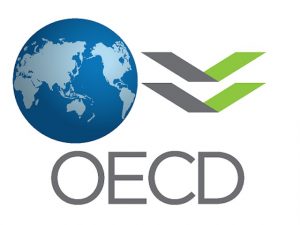
India and the majority of the members of OECD-G20 Inclusive Framework on Base Erosion and Profit Shifting (BEPS) have joined a new two-pillar plan to reform international taxation rules.
- The two-pillar plan – inclusive framework tax deal on Base Erosion and Profit Shifting (BEPS)- seeks to reform international tax rules and ensure that multinational enterprises pay their fair share wherever they operate.
- The signatories of the plan amounted to 130 countries and jurisdictions, representing more than 90% of global GDP.
- The new framework seeks to address the tax challenges arising from the digitalisation of economies.
- It also seeks to address concerns over cross-border profit shifting and bring in subject-to-tax rule to stop treaty shopping.
- Treaty shopping is an attempt by a person to indirectly access the benefits of a tax treaty between two countries without being a resident of any of those.
Two Pillar Plan:
- Pillar One:
- It will ensure a fairer distribution of profits and taxing rights among countries with respect to the largest MNEs, including digital companies.
- It would re-allocate some taxing rights over MNEs from their home countries to the markets where they have business activities and earn profits, regardless of whether firms have a physical presence there.
- According to OECD, more than USD 100 billion of profit are expected to be reallocated to market jurisdictions each year.
- Pillar Two:
- It is about minimum tax and subject-to-tax rules (All sources of income liable to tax without taking account of tax allowances).
- It seeks to put a minimum standard tax rate among countries through a global minimum corporate tax rate, currently proposed at 15%.
- This is expected to generate an additional USD 150 billion in tax revenues.
Base Erosion and Profit Shifting (BEPS):
- BEPS is a term used to describe tax planning strategies that exploit mismatches and gaps that exist between the tax rules of different jurisdictions.
- The BEPS initiative is an OECD initiative, approved by the G20, to identify ways of providing more standardised tax rules globally.
- OECD: It is an intergovernmental economic organisation, founded to stimulate economic progress and world trade.
- Most OECD members are high-income economies and are regarded as developed countries.
- G20: It is the leading international forum for economic, financial and political cooperation of large economies.
- India is a member of G20, however, not a member but a key partner of OECD
Organization Of The Petroleum Exporting Countries (OPEC+) Plus:
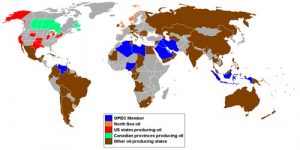
The United Arab Emirates (UAE) pushed back against a plan by the Organization of the Petroleum Exporting Countries (OPEC+) Plus group to extend the global pact to cut oil production beyond April 2022.
The Output Pact & Fluctuating Oil Price:
- The OPEC+ group of countries had, in April 2020, entered into a two-year agreement (Output Pact), which entailed steep cuts in crude production to deal with a sharp fall in the price of oil as a result of the Covid-19 pandemic.
- The price of Brent crude hit an 18-year low of under USD 20 per barrel in April 2020 as economic activity around the world crashed as countries dealt with the pandemic.
- In November 2020, the prices started rising and in July 2021, they were USD 76.5 per barrel mainly due to the steady rollout of vaccination programmes around the world.
- OPEC+, however, maintained lower levels of production despite crude oil prices reaching pre-Covid levels, with Saudi Arabia, notably, announcing a further cut in production of 1 million barrels per day for the February-to-April period, which helped boost rising prices even further.
- The OPEC+ group ran into sharp criticism from developing economies, including India, for deliberately maintaining low supply levels to raise prices.
- In April, OPEC+ agreed to gradually increase crude production, including a phased end to Saudi Arabia’s 1 million barrel per day cut in production by July.
- UAE agreed that there was a need to increase crude oil production from August 2021, but did not agree to a condition by the OPEC Joint Ministerial Monitoring Committee (JMMC) that the two-year production agreement be extended by six months.
- The UAE’s key objection to the existing agreement is the reference output used to calculate the total production apportioned to each oil-exporting country.
- The baseline production level reference used in the current agreement was not reflective of the UAE’s production capacity and, therefore, led to the UAE being apportioned a lower share of total production of crude oil.
- UAE would be open to extending the agreement if baseline production levels were reviewed to be fair to all parties.
NIPUN Bharat Mission:
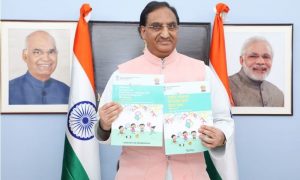
The Ministry of Education has launched NIPUN (National Initiative for Proficiency in Reading with Understanding and Numeracy) Bharat Scheme.
- It aims to cover the learning needs of children in the age group of 3 to 9 years.
- This initiative is being launched as a part of NEP (National Education Policy) 2020.
- This policy aims to pave the way for transformational reforms in school and higher education systems in the country. This policy replaced the 34 year old National Policy on Education (NPE), 1986.
- Objective:
- To create an enabling environment to ensure universal acquisition of foundational literacy and numeracy, so that every child achieves the desired learning competencies in reading, writing and numeracy by the end of Grade 3, by 2026-27.
- It will focus on providing access and retaining children in foundational years of schooling; teacher capacity building; development of high quality and diversified Student and Teacher Resources/Learning Materials; and tracking the progress of each child in achieving learning outcomes.
- NIPUN Bharat will be implemented by the Department of School Education and Literacy.
- A five-tier implementation mechanism will be set up at the National- State- District- Block- School level in all States and UTs, under the aegis of the centrally sponsored scheme of Samagra Shiksha.
- ‘Samagra Shiksha’ programme was launched subsuming three existing schemes: Sarva Shiksha Abhiyan (SSA), Rashtriya Madhyamik Shiksha Abhiyan (RMSA) and Teacher Education (TE).
- The aim of the scheme is to treat school education holistically, from pre-school to Class XII.
- A special package for foundational literacy and Numeracy (FLN) under NISHTHA (National Initiative for School Heads and Teachers Holistic Advancement) is being developed by NCERT.
- Around 25 lakh teachers teaching at pre-primary to primary grade will be trained this year on FLN.
- NISHTHA is a capacity building programme for “Improving Quality of School Education through Integrated Teacher Training”.
- Stage-wise targets are being set in a continuum from the pre-primary or balvatika classes.
Forest Rights Act (FRA):

Ministry of Tribal Affairs and Ministry of Environment have jointly decided to give more powers to the tribal communities in managing the forest resources. A “Joint Communication” to this effect has been signed.
- The Joint Communication, pertains to effective implementation of the Scheduled Tribes and Other Traditional Forest Dwellers (Recognition of Forest Rights) Act, 2006, which is commonly known as Forest Rights Act (FRA).
- The Act recognizes and vests the forest rights and occupation in forest land in forest dwelling scheduled tribes (FDSTs) and other traditional forest dwellers (OTFDs) who have been residing in such forests for generations but whose rights could not be recorded.
- It provides a framework for recording the forest rights so vested and the nature of evidence required for such recognition and vesting in respect of forest land.
- The act identifies four types of rights:
- Title rights
- Use rights
- Relief and development rights
- Forest management rights
Section 43D(5) Of The Unlawful Atrocities Prevention Act (UAPA):
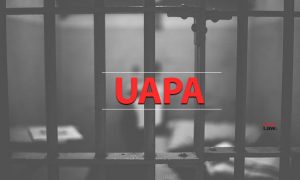
Just two days before his death, Stan Swamy had moved the Bombay High Court challenging Section 43D(5) of the Unlawful Atrocities Prevention Act (UAPA) — a provision Swamy termed “illusory”.
- The provision makes grant of bail virtually impossible under UAPA since it leaves little room of judicial reasoning.
- The UAPA, enacted in 1967, was strengthened by the Congress-led UPA government in 2008 and 2012.
- The test for denying bail under the UAPA is that the court must be satisfied that a “prima facie” case exists against the accused.
- In 2019, the SC defined prima facie narrowly to mean that the courts must not analyse evidence or circumstances but look at the “totality of the case” presented by the state.
- Section 43D(5) reads: “Notwithstanding anything contained in the Code, no person accused of an offence punishable under Chapters IV and VI of this Act shall, if in custody, be released on bail or on his own bond unless the Public Prosecutor has been given an opportunity of being heard on the application for such release.
Indian Army Memorial At Cassino:
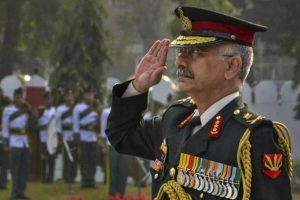
During his four-day visit to the UK and Italy, Indian Army Chief Manoj Naravane will inaugurate the Indian Army Memorial at Cassino in Italy, about 140 km away from Rome.
- The memorial commemorates over 3,100 Commonwealth servicemen who took part in the effort to liberate Italy in World War II.
- Apart from this, 900 Indian soldiers were also commemorated on this memorial.
- Under Benito Mussolini, Italy had joined Nazi Germany in 1936 and in 1940 it entered WWII (1939-1945) against the Allies.
- But in 1943, Mussolini was overthrown and instead, Italy declared war on Germany.
- The invasion of Italy by the Allies coincided with an armistice that was made with the Italians.
- Indian Army was the largest volunteer force during WWII, with over 2.5 million Indians participating.
- These troops fought the Axis powers (Germany, Italy and Japan) as part of the Allies.
- Three infantry divisions of the Indian Army took part in the Italian campaign. These were the 4th, 8th and 10th Indian Divisions.
New IT Rules:

The Centre has told the Delhi High Court that social media giant Twitter Inc has failed to comply with India’s new IT Rules (Came into force on 26th May), which is law of the land and is mandatorily required to be complied with.
- Any non-compliance amounts to breach of provisions of IT Rules, leading to Twitter losing its immunity as an “intermediary”.
- A loss of its intermediary status, which provides its immunity from liabilities over any third-party data hosted by it, makes it liable for criminal action in case of complaints.
- Twitter Inc is admittedly an ‘intermediary’ within the meaning of Section 2(1)(w) of IT Act, 2000, and an SSMI (Significant Social Media Intermediary) under the IT Rules 2021.
- SSMIs are required to appoint a chief compliance officer, a nodal officer, and a grievance officer — all whom are required to be residents of India, according to the IT rules.
- On February 25, the Centre framed the Information Technology (Intermediary Guidelines and Digital Media Ethics Code) Rules 2021, in the exercise of powers under section 87 (2) of the Information Technology Act, 2000 and in supersession of the earlier Information Technology (Intermediary Guidelines) Rules 2011, which will come into effect from May 26.
The new rules:
- It mandates a grievance redressal system for over the top (OTT) and digital portals in the country.
- This is necessary for the users of social media to raise their grievance against the misuse of social media.
- Significant social media firms have to appoint a chief compliance officer and have a nodal contact person who can be in touch with law enforcement agencies 24/7.
- A grievance officer: Social media platforms will also have to name a grievance officer who shall register the grievance within 24 hours and dispose of it in 15 days.
- Removal of content: If there are complaints against the dignity of users, particularly women – about exposed private parts of individuals or nudity or sexual act or impersonation etc – social media platforms will be required to remove that within 24 hours after a complaint is made.
- A monthly report: They also will have to publish a monthly report about the number of complaints received and the status of redressal.
- There will be three levels of regulation for news publishers — self-regulation, a self-regulatory body, headed by a retired judge or an eminent person, and oversight from the Information and Broadcasting Ministry, including codes of practices and a grievance committee.
Discrete Auroras On Mars:

The UAE’s Hope spacecraft, which is orbiting Mars since February this year, has captured images of glowing atmospheric lights known as discrete auroras.
Uniqueness of these auroras:
- Unlike auroras on Earth, which are seen only near the north and south poles, discrete auroras on Mars are seen all around the planet at night time.
- Auroras are caused when charged particles ejected from the Sun’s surface — called the solar wind — enter the Earth’s atmosphere.
- These particles are harmful, and our planet is protected by the geomagnetic field, which preserves life by shielding us from the solar wind.
- However, at the north and south poles, some of these solar wind particles are able to continuously stream down, and interact with different gases in the atmosphere to cause a display of light in the night sky.
- This display, known as an aurora, is seen from the Earth’s high latitude regions (called the auroral oval), and is active all year round.
Aurora borealis and australis:
- In the northern part of our globe, the polar lights are called aurora borealis or Northern Lights.
- In the south, they are called aurora australis or southern lights, and are visible from high latitudes in Antarctica, Chile, Argentina, New Zealand and Australia.
Solicitor General:
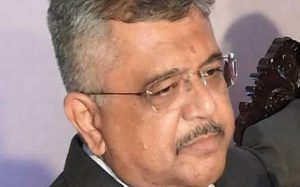
A delegation of Trinamool Congress (TMC) MPs recently met President Ram Nath Kovind and sought the removal of Tushar Mehta as the Solicitor General of India, on the grounds of “criminal misconduct” and “gross impropriety” following his meeting with BJP MLA Suvendu Adhikari.
- Suvendu Adhikari is an accused in the 2016 Narada tapes case, and Mr. Mehta is representing the CBI in the Supreme Court and the Calcutta High Court in the agency’s probe against senior TMC leaders in the matter.
- Experts say such a meeting, between one of the highest serving law officers of India, the Solicitor General, who is also appointed as the Special Public Prosecutor for the CBI and an accused person being investigated by the same agency, raises extremely serious doubts of impropriety.
- Also, Such meetings make a mockery of the criminal justice system and would only serve to destroy the common man’s faith in the judiciary.
Solicitor General:
- Solicitor General is the second highest law officer in the country.
- He is subordinate to the Attorney General of India, the highest law officer and works under him.
- He also advises the government in legal matters.
- Solicitor general is appointed for period of three years by Appointment Committee of Cabinet chaired by Prime Minister.




